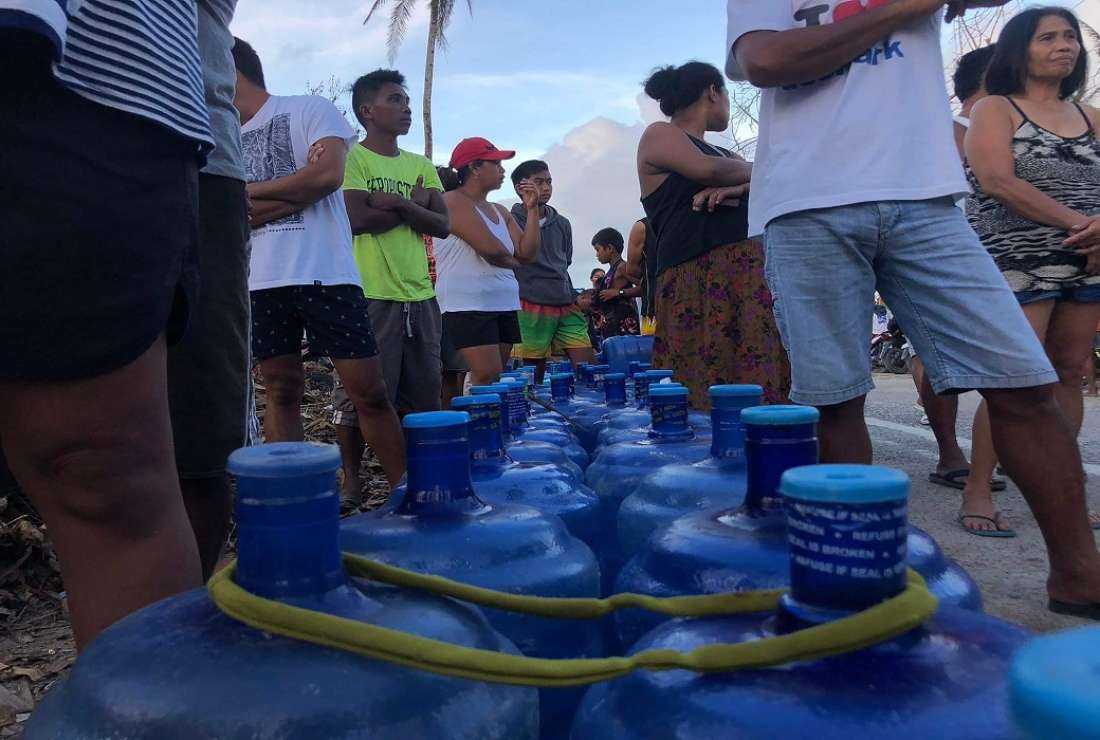
Health dept confirms presence of coliform and E-coli bacteria in tap water, main source of portable water

Residents with their water plastic containers queue up to receive free drinking water at a village in General Luna town, Siargao island, on December 23, 2021. (Photo: AFP)
Two provinces in the Philippines are still reeling from water-borne diseases which started in January this year with no end in sight.
Local governments have declared a state of health emergency after more than 200 cases were recorded between Jan. 1 and Feb. 23 in Negros Occidental and Kalinga Provinces, said Maria Rosario Vergeire, health undersecretary, at a press conference on April 11.
Vergeire said coliform and E-coli bacteria have infected people through contaminated food and water.
“Water is contaminated if it comes in direct contact with fecal matter. When water touches bed rocks or soil comes into contact with feces, these bacteria thrive,” Vergeira said.
The undersecretary asked pig farmers to dispose of the feces of their animals properly in order not to infect ground water.
“Dispose of the natural waste of your animals properly. It poses a heath risk to all,” Vergeire.
Negros Occidental is known as the biggest producer of pigs raised in local backyards.
Students in the province contracted the diseases by buying food and drinks at local food stalls located near their schools.
“My son got it because he is fond of buying buko [coconut] juice. I always give him a sandwich for snacks but he buys juice at the school,” Emilyn Dionio, 32, told UCA News.
Doctors confirmed, after laboratory tests, he had E-coli,” San Carlos mother Dionio told UCA News.
Another resident whose mother was rushed to the hospital during Holy Week claimed her mother was diagnosed with amoebiasis.
“She was supposed to join the Holy Wednesday procession when suddenly she collapsed. She was given medication for three days,” Sharon Soria, 52, told UCA News.
Residents of Kalinga province have reported sporadic cases of amoebiasis, which first appeared in November last year.
“Households are still being infected with amoebiasis. Our patients here are mostly children,” Selma Advincula, 29, a mother of an infected child told UCA News.
Residents of San Carlos City in Negros Occidental province said many are still getting sick despite government intervention since March.
“Since February, cases of amoebiasis and acute gastroenteritis have totaled more than 700 cases in 18 local communities,” Anthony Bucay, 32, a San Carlos City resident said.
Residents of San Carlos City are accustomed to drinking tap water, which has made the spread of E-coli rampant.
The Department of Health has set up 25 sampling points in the province and confirmed the presence of coliform and E-coli bacteria in tap water.
“Many of us do not buy purified water because we are used to drinking from the tap. We did not expect it to be contaminated,” Bucay said.
In November 2022, 109 residents in the province were hit by symptoms associated with amoebasis, according to health officer Dr. Carlos Cortina III.
Filipino infectious disease experts blamed lack of water supply and sanitation for the spread of the diseases.
“It is still a custom in many Filipino families to gather water in containers because the supply is intermittent.These are breeding places of bacteria… of course, not having a proper septic tank also pollutes the ground water,” physician and infectious diseases expert Harvey Liwanag told UCA News.
Help us keep UCA News independent
The Church in Asia needs objective and independent journalism to speak the truth about the Church and the state.
With a network of professionally qualified journalists and editors across Asia, UCA News is just about meeting that need. But professionalism does not come cheap. We depend on you, our readers, to help maintain our independence and seek that truth.
A small donation of US$2 a month would make a big difference in our quest to achieve our goal.

Share your comments